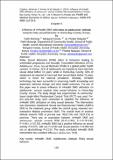| dc.description.abstract | Abstract
Risky Sexual Behaviors (RSB) refers to behaviors leading to
unintended pregnancies and Sexually Transmitted Infections (STIs).
Adolescents’ Risky Sexual Behavior (RSB) is a global public health
concern. In Kenya, 21% of adolescents are reported to have had their
sexual debut before 15 years; while in Homa-Bay County, 60% of
adolescent are reported to have had their sexual debut before 15 years
which is thrice the national prevalence. Globally, mHealth
technology has been successful in improving health knowledge and
awareness, behavior change, and other health outcomes. The aim of
this paper was to assess influence of mHealth SMS utilization on
adolescents’ attitude towards risky sexual behavior in Homa-Bay
County, Kenya. The study design was experimental. A communitybased single-blind Randomized Control Trial (RCT) was used. Pretest post-test study were conducted to establish the influence of
mHealth SMS utilization on risky sexual behavior. The Intervention
was interactive Adolescent Sexual and Reproductive Health (ASRH)
SMS to the treatment group while the control group received noninteractive Malaria prevention SMS. The overall level of positive
attitude towards RSB at pre-test was 79(22.1%) and 73(24.1%) at
post-test. There was an association between mHealth SMS and
adolescents’ attitude towards RSB (O.R.=1.916; C.I.=0.78-3.82;
P=0.003; χ2=27.92). mHealth SMS had a positive influence on sexual
activity P=0.075, safe sex P=0.033 and sexual partners P=0.009 but
not on alcohol/drugs P=0.214. The study concluded mHealth SMS
intervention has a positive influence adolescents’ RSB. | en_US |

